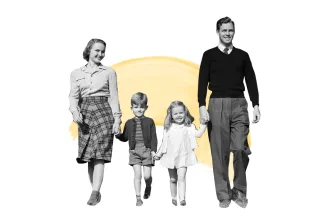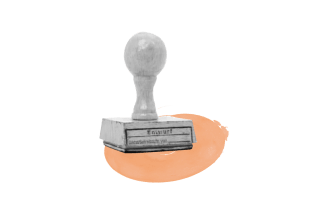Name Directory by Last Name: Last Names Starting with Ga
Explore millions of names to discover rich genealogical details and uncover your family's history
Enter a name to research
Last name meanings and origins
- Garcia
The surname Garcia has deep historical roots, primarily traced back to the Iberian Peninsula, particularly in Spain. It is derived from the Basque word "artz," meaning "bear," and has evolved over time to signify "son of Garcia" or "descendant of Garcia." The name first appeared in written records in the 9th century, often associated with noble families and landowners.
- Gardner
The surname Gardner has its historical roots in the Old French word "gardinier," which means "gardener" or "one who tends a garden." This occupational surname first appeared in England after the Norman Conquest of 1066, when many French words and customs were introduced into the English language. The name likely referred to individuals who were responsible for the cultivation of gardens or lands, reflecting a vital role in agrarian societies.
- Garrett
The surname Garrett has its roots in the Old French name "Garrard," which itself is derived from the Germanic elements "ger," meaning spear, and "hard," meaning brave or strong. The name first appeared in England after the Norman Conquest of 1066, where it was introduced by the Normans.
- Gallagher
The surname Gallagher has its roots in Ireland, specifically deriving from the Gaelic name "O'Gallchobhair," which translates to "descendant of Gallchobhar." The name Gallchobhar itself is believed to mean "foreign help" or "helper," reflecting a historical context where individuals with this name may have been associated with providing assistance or support, possibly in military or community contexts. The Gallagher family is traditionally linked to County Donegal, where they were part of the Gaelic nobility.
- Garner
The surname Garner has its roots in the Old French word "gerner," which means "to gather" or "to store," particularly in relation to grain. This occupational surname likely originated in medieval England, where it was first recorded in the 13th century.
- Gates
The surname Gates has its origins in medieval England, deriving from the Old English word "geat," which means "gate" or "opening." This suggests that the name was likely used to denote someone who lived near a gate or a significant entrance, possibly to a town or estate. The earliest recorded instances of the surname date back to the 13th century, with individuals bearing the name appearing in various historical documents.
- Gauthier
The surname Gauthier has its roots in the Old French personal name "Gautier," which is derived from the Germanic elements "wald," meaning "rule," and "heri," meaning "army." This surname first appeared in France during the medieval period, particularly in the northern regions, where it was common for surnames to evolve from given names. Over time, Gauthier became associated with various occupations, often linked to nobility or landholding, reflecting the social hierarchy of the time.
- Gagnon
The surname Gagnon has its roots in France, particularly in the region of Normandy, where it first appeared in the medieval period. The name is derived from the Old French word "gagnon," which means "a farmer" or "one who works the land." This occupational surname reflects the agrarian lifestyle of the early bearers, who were likely involved in farming and land cultivation.
- Gardiner
The surname Gardiner has its historical roots in England, deriving from the Old French word "gardinier," which means "gardener." This occupational surname first appeared in the medieval period, particularly in the 12th century, as a designation for those who tended gardens or worked in horticulture. The role of a gardener was significant in agrarian societies, where the cultivation of plants for food and ornamental purposes was essential.
- Garland
The surname Garland has its historical roots in medieval England, deriving from the Old French word "garlande," which means "a wreath or crown of flowers." This term was introduced to England after the Norman Conquest of 1066, and it initially referred to a decorative headpiece made of flowers or leaves, symbolizing honor and celebration. Over time, the surname became associated with individuals who were involved in the making of garlands or who held roles in festivities, such as musicians or entertainers.
- Garrison
The surname Garrison has its historical roots in the Old French word "garison," which means "to defend" or "to protect." It is believed to have originated in the medieval period, particularly in England, where it was used to denote someone who lived near or worked at a fortified place or garrison. The name likely developed as a topographical surname for individuals residing near a military stronghold or as an occupational surname for those involved in the defense of such locations.
- Gale
The surname Gale has its historical roots in England, with origins tracing back to the Old English word "gæle," meaning "cheerful" or "merry." It first appeared in written records during the medieval period, particularly in the 13th century. The name was often associated with individuals who were known for their jovial nature or perhaps their roles in the community as entertainers or musicians.
- Garnier
The surname Garnier has its roots in medieval France, deriving from the Old French personal name "Garnier," which itself is derived from the Germanic elements "garn" meaning "warrior" and "hari" meaning "army." The name first appeared in historical records during the 11th century, particularly in regions such as Normandy and Picardy. Over time, the surname became associated with various occupations, particularly in agriculture and military service, reflecting the feudal society of the time.
- Galloway
The surname Galloway has its historical roots in Scotland, specifically linked to the region of Galloway, which is located in the southwestern part of the country. The name is derived from the Gaelic "Gallaibh," meaning "foreigner" or "stranger," and it is believed to have originally referred to the Norse settlers who inhabited the area during the Viking Age.
- Gautier
The surname Gautier has its roots in the Old French personal name "Gautier," which is derived from the Germanic elements "wald," meaning "rule," and "heri," meaning "army." This surname first appeared in France during the medieval period, particularly in the northern regions, where it was common for surnames to evolve from given names. Over time, Gautier became associated with various occupations, often linked to nobility or military roles, reflecting the strength and leadership qualities of those who bore the name.
- Gamble
The surname Gamble has its historical roots primarily in England, with origins that can be traced back to the Old Norse word "gambol," meaning to leap or frolic, which reflects a lively or playful character. The name likely emerged in the medieval period, around the 12th century, and was associated with individuals who may have been involved in occupations related to entertainment or physical activities.
- Gable
The surname Gable has its historical roots primarily in England, where it is believed to have originated as a topographic name for someone who lived near a gable, which is the triangular portion of a wall between the edges of a sloping roof. The term itself derives from the Old French word "gable," which has its origins in the Latin "capitia," meaning "head." The surname first appeared in written records during the medieval period, with its usage becoming more common as surnames became hereditary.
- Gaines
The surname Gaines has its historical roots in England, deriving from the Old French name "Gagne," which means "to earn" or "to gain." This surname first appeared in the medieval period, particularly after the Norman Conquest of 1066, when many French names were introduced into English society. The Gaines family name is often associated with various occupations, particularly in agriculture or trade, reflecting the economic activities of those who bore the name.
- Gaillard
The surname Gaillard has its historical roots in France, deriving from the Old French word "gaillard," which means "lively" or "brave." It first appeared in the medieval period, particularly in the regions of Normandy and Brittany, where it was often associated with individuals known for their spirited nature or martial prowess. Over time, the surname became linked to various occupations, including those of soldiers and merchants, reflecting the dynamic social roles of its bearers.
- Gabriel
The surname Gabriel has deep historical roots, primarily derived from the Hebrew name "Gavri'el," meaning "God is my strength." It first appeared in the biblical context, associated with the archangel Gabriel, who serves as a messenger of God. The name gained prominence in various cultures, particularly within Jewish, Christian, and Islamic traditions, where it symbolizes divine strength and communication.
- Gage
The surname Gage has its historical roots in England, with origins tracing back to the Old French word "gage," meaning a pledge or a promise. It first appeared in the medieval period, particularly in the 12th century, when it was often associated with individuals who served as guarantors or sureties in legal matters.
- Garza
The surname Garza has its historical roots in the Iberian Peninsula, particularly in Spain, where it is believed to have originated from the Spanish word "garza," meaning "heron." This connection to the heron may reflect the geographical features of the regions where the name first appeared, as these birds are often found near water bodies. The surname likely emerged during the Middle Ages, a period marked by the consolidation of family names based on occupations, physical characteristics, or local flora and fauna.
- Gannon
The surname Gannon has its roots in Ireland, deriving from the Gaelic name "O'Gannain," which means "descendant of Gannán." The name Gannán itself is believed to be derived from the word "gann," meaning "little" or "young." The O'Gannain family was historically associated with the province of Connacht, particularly in County Galway, where they were part of the Gaelic nobility. Over time, the surname evolved, with variations appearing in spelling and pronunciation, particularly as families migrated or adapted to English-speaking environments.
- Garfield
The surname Garfield has its historical roots in England, with its earliest appearances dating back to the medieval period. The name is believed to derive from the Old English elements "gar," meaning spear, and "field," referring to an open area or pasture.
- Gagne
The surname Gagne has its roots in France, deriving from the Old French word "gagner," which means "to earn" or "to gain." Historically, it is believed to have first appeared in the northern regions of France, particularly in Normandy, during the medieval period. The name likely developed as a nickname for someone who was a laborer or engaged in trade, reflecting the economic activities of the time.
- Gary
The surname Gary has its roots in the Old French name "Gari," which is derived from the Germanic name "Gerhard," meaning "spear strength." The name first appeared in historical records during the medieval period, particularly in France and England, where it was often associated with individuals who held positions of nobility or military service. Over time, the surname evolved, with variations appearing in different regions, reflecting the occupations and social roles of those who bore it.
- Garnett
The surname Garnett has its historical roots in England, with its earliest appearances dating back to the medieval period. It is believed to derive from the Old French personal name "Garnier," which means "to equip" or "to furnish," and was introduced to England after the Norman Conquest of 1066.
- Gaston
The surname Gaston has its historical roots in France, deriving from the Old French personal name "Gaston," which itself is derived from the Germanic name "Gast," meaning "guest" or "stranger." The name first appeared in the medieval period, particularly in the region of Gascony, which is located in southwestern France. Over time, the surname became associated with nobility and landowners, as many individuals bearing the name held significant social roles within their communities.
- Gaynor
The surname Gaynor has its historical roots primarily in Ireland and Wales, deriving from the Gaelic name "O'Gadhra," which means "descendant of Gadhra." The name is believed to have originated in the 11th century, with the Gadhra family being associated with the province of Connacht in Ireland. Over time, the surname evolved, with variations appearing in different regions, including "Gainer" and "Gaynor." Traditionally, the name has been linked to occupations such as farming or landholding, reflecting the agrarian lifestyle of early bearers.
- Garvey
The surname Garvey has its historical roots primarily in Ireland, deriving from the Gaelic name "Gairbhith," which translates to "rough" or "harsh." The name is believed to have first appeared in the 12th century, particularly in the province of Munster. Over time, the Garvey surname became associated with various occupations, including farming and craftsmanship, reflecting the agrarian lifestyle of many Irish families.
- Gallo
The surname Gallo has its roots in Italy, deriving from the Latin word "gallus," which means "rooster" or "cock." This association with the rooster may have symbolized traits such as vigilance and courage, which were valued in various social contexts. The surname first appeared in historical records during the Middle Ages, particularly in regions like Sicily and southern Italy, where it was often linked to agricultural communities.
- Gaffney
The surname Gaffney has its roots in Ireland, particularly associated with the Gaelic name "Mac Gabhann," which translates to "son of Gabhann." The name Gabhann itself is believed to derive from the word for "smith," indicating a historical connection to the occupation of blacksmithing. The Gaffneys were primarily found in County Kerry and County Clare, where they were part of the Gaelic nobility.
- Galvin
The surname Galvin has its roots in Ireland, deriving from the Gaelic name "Gailbhín," which is believed to mean "little foreigner" or "savage." The name first appeared in historical records in the 12th century, particularly in the province of Munster, where the Galvins were associated with the region of Kerry. Over time, the surname became linked to various occupations, including farming and trade, as many bearers of the name were involved in agrarian lifestyles or local commerce.
- Gavin
The surname Gavin has its roots in the Old French name "Gauvain," which is derived from the Welsh name "Gwalchmai," meaning "hawk of May." The name gained prominence in medieval times, particularly through the legend of Sir Gawain, a knight of King Arthur's Round Table, who symbolized chivalry and valor. The surname began to appear in written records in England and Scotland during the 12th century, often associated with noble families and landowners.
- Garber
The surname Garber has its historical roots in the German-speaking regions of Europe, particularly among Jewish communities. The name is derived from the Yiddish word "garber," which means "tailor," indicating that the original bearers of the surname were likely involved in the tailoring profession.
- Galbraith
The surname Galbraith has its roots in Scotland, particularly in the region of Strathclyde, where it is believed to have originated from the Gaelic name "Gille Brìghde," meaning "servant of St. Bridget." The name first appeared in historical records in the 12th century, associated with the Galbraith family, who were landowners and held significant social status.
- Gall
The surname Gall has its historical roots primarily in the Germanic and Celtic regions of Europe, with its earliest appearances traced back to the Middle Ages. The name is believed to derive from the Old High German word "galla," meaning "gall," which refers to a bitter substance produced by certain plants, or it may relate to the Celtic word "gall," meaning "foreigner" or "stranger." Over time, the surname became associated with various occupations, particularly in agriculture and trade, as individuals with this name often engaged in farming or were involved in the local markets.
- Garvin
The surname Garvin has its historical roots primarily in Ireland and Scotland, deriving from the Gaelic name "Gairbhín," which means "rough" or "savage." The name is believed to have first appeared in the early medieval period, with its earliest records found in the 12th century. Over time, the Garvin surname became associated with various occupations, particularly in agriculture and craftsmanship, reflecting the agrarian lifestyle of early Irish and Scottish communities.
- Gallant
The surname Gallant has its historical roots in the Old French word "galant," which means "brave," "courteous," or "gallant." It first appeared in France during the medieval period, particularly in the 12th century, as a descriptor for individuals who exhibited chivalrous qualities or noble behavior. Over time, the surname became associated with various occupations, particularly those linked to the military or nobility, reflecting the valor and honor of its bearers.
- Gant
The surname Gant has its historical roots primarily in England, with its earliest appearances dating back to the medieval period. The name is believed to derive from the Old French word "gant," meaning "glove," which may have been used as a nickname for someone who made or sold gloves, or it could refer to a person who was particularly skilled or dexterous.
Start your family tree for free
Start by entering a few names and MyHeritage will do the rest, so you can make meaningful discoveries
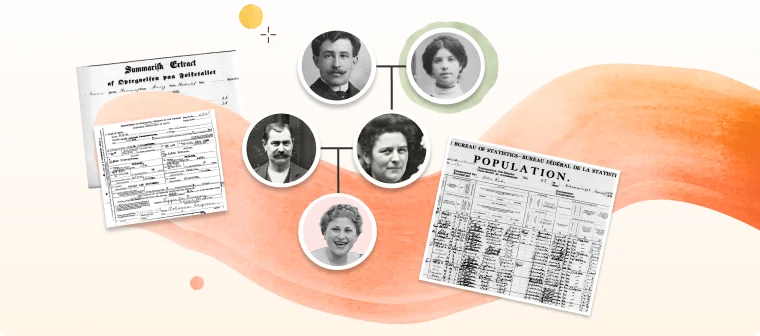
Explore historical records
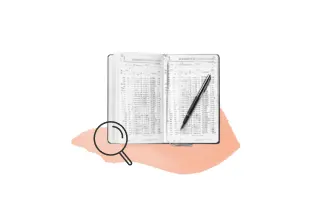
Explore 1,810,427,080 census and voter list records to get a detailed snapshot of your ancestors' lives. Discover names, ages, occupations, family relationships, residences, and much more.

Explore 4,647,704,406 birth, marriage, and death records. Uncover valuable details about major family milestones and find names, dates, places, occupations, and residences of your ancestors and relatives.

Search 266,544,192 military records and discover the stories of courage and resilience in your family history. Military records include enlistment dates, ranks, locations, and even physical descriptions.
Embark on a fascinating journey to discover your family history

Start by adding a few names. Myheritage's automatic matching technology will help you expand your family tree and delight you with new discoveries.

Reveal your ethnic origins and find relatives you never knew existed with our simple DNA kit.
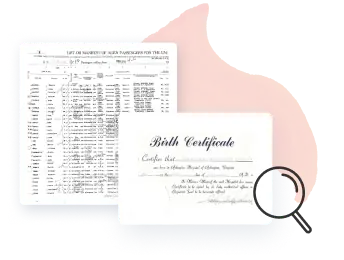
Dive into MyHeritage's international collection of 36.7 billion historical records - start with a name of an ancestor and see what our collections can reveal about your family history.
About MyHeritage

MyHeritage is the leading global platform for family history. It enriches the lives of people worldwide by enabling them to uncover more about themselves and where they belong. With a suite of intuitive products, billions of historical records, an affordable at-home DNA test, and AI-powered photo tools, MyHeritage creates a meaningful discovery experience that is deeply rewarding. The MyHeritage platform is enjoyed by tens of millions of people around the world who treasure and celebrate their heritage.

